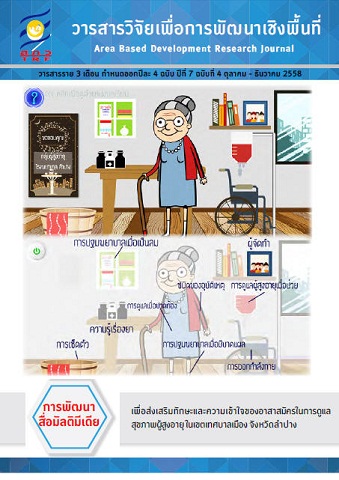กระบวนการเรียนรู้เพื่อสร้างความมั่นคงในการประกอบอาชีพเพาะเลี้ยงสัตว์น้ำของเกษตรกรบ้านยางน้อย อำเภอโกสุมพิสัย จังหวัดมหาสารคาม
Main Article Content
Abstract
บทคัดย่อไม่สมบูรณ์
The learning process for the occupational security in fish farming of Ban Yang Noi , Yang Noi Sub-district, Kosoompisai District, Maha Sarakham Province
A participatory action research (PAR: Participatory Action Research) on the learning process for the occupational security in fish farming of Ban Yang Noi, Yang Noi Sub-district, Kosoompisai District, Maha Sarakham Province was conducted. The objectives of this research are to study the situation and issues related to occupational fish farming, availability of social capital (knowledge, techniques and wisdom), the factors and conditions of risk associated in fish farming occupations. The results were used to create a learning process to achieve security and stability in the profession of fish farming in the community. The results revealed that Ban Yang Noi has a largest number of fish hatchery farms in Maha Sarakham province. Most villagers have been working as fish farmers for many decades. Fish hatcheries in this area produce millions of fry sold across the country each year. Farmers who began his career in the early stages have made a very good income from selling fish to the state, stimulating aquaculture business to expand rapidly. Kosoompisai Fisheries and Aquaculture Cooperatives were established by the integration of fish hatchery operators in 1993, the first term cooperative was successful and has been awarded a cooperative of great distinction in 1999. After that, the operation of cooperative has started facing the fierce market competition with many other farmers around the region. Since most fish hatcheries in this community produce a few fish species similar to those in the nearby region, this causes a problem of excessive fish supply rendering selling price drop sharply. The production system was inefficient due to lack of good practice, new fish species and appropriate technical know-how, as well as the problem of risen production costs. As a result, many farmers lost and discontinued their businesses. The remaining farmers have severely faced the problems of lack of quality fish breeders and the presence of natural threats such as climate change that leads to variable and uncertain amount of rainfall each year. The increased input prices with the decreased sales of fish fry have caused the fish hatchery business sluggish. Most fish farmers have reduced their production volumes and cut down the numbers of employees to allow only the occasional daily job or inevitably they have to terminate the employment of their staff. All these constraints had great adverse impact on social, economic, community. Most farms are at risk of going out of business soon if they cannot adapt to cope with the current situations. Younger farmers have been passed down all the knowledge and wisdom from old generation such as optimal conditions of soil and techniques for hatchery. The information of social capital, farmers have their own lands and also the water resource within the community. In order to create the occupational security and stability in fish hatchery business, building the immunity to the community have been conducted to reduce the risk by using a learning process to teach community members the know how to analyze the cause and effect and using this knowledge to solve their problems. Initiative development in economic, social and environment must be done by members of the community who truly understand the problems, and they must work together to collect, analyze, and solve the problems properly. Building learning process through integrating local wisdom in fish propagation already existed in the community with appropriate external technology were used to solve marketing problems. Improved methods of cultivation and fish nursery, improved breeders quality and ability to adapt to natural threats will assist fish hatchery operators in coping with unpredictive situations.
Article Details
Area Based Development Research Journal values copyright protection and licensing to safeguard author rights and facilitate the appropriate dissemination of research. Our policies ensure openness, accessibility, and attribution. Authors retain copyright ownership, and articles are published under a Creative Commons Attribution License (CC BY), allowing sharing, adaptation, and proper attribution. Authors have the freedom to publish under the CC BY license, granting broad reuse and distribution permissions. The journal supports posting articles on third-party repositories, adhering to institutional and funding restrictions. Author guidelines detail copyright and licensing requirements, empowering authors with knowledge about their rights and responsibilities. These policies cultivate an environment of collaboration, openness, and responsible sharing, benefiting authors and the research community while honoring intellectual property rights.


